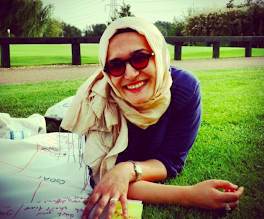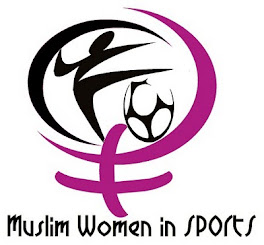
Munich, Germany - Fatima Geza Abdollahyan had just arrived back at her hotel in Amsterdam when she sat down to read her emails. After a long day at a documentary film festival, her tired eyes scanned the “Received From” column, finally coming to rest on “Sundance Festival 2010.” “Oh,” she thought to herself, “this must be the rejection letter.”
But Fate had a different plan in store for Fatima: “I read the first few lines, beginning with ‘We congratulate you…’ 3 times in a row – I could not believe that I was accepted!”
“Now, I need a drink,” she said.
Born in Frankfurt, Germany, Fatima was raised by her Iranian parents speaking Persian, German, English and French. She studied Political Science and earned a Master’s in International Relations before deciding, in 2001, to study film at the University of Television and Film Munich.
While working in the correspondence office of a German television station in Tehran in 2005, Fatima covered the Muslim Women’s Games, a female sporting event that took place every 4 years (but are no longer running). Organized by the Iranian government, Muslim women from every corner of the globe – including the US – would descend on Tehran to compete for a week in a variety of disciplines.
“This was the first time I realized how difficult it is for Muslim women to do sports in a passionate way. But they did it so well – with great self-understanding and ease,” said Fatima recently in an exclusive interview with NIAC.
Sara Khoshjamal-Fekri
At the games she met Sara Khoshjamal-Fekri, a Taekwondo expert who hailed from a lower middle class family in Southern Tehran. “Even at 17 she had so much charisma and will to make it,” Fatima said. Women like Sara inspired Fatima to plan a documentary on female professional athletes in Iran, focusing on three women in three unique sports. Over the next two years, Fatima conducted research and conceptualized the documentary.
First Female Iranian Olympian
In 2007 the twenty-year-old Sara became the first female Iranian athlete to qualify for the Olympics. The young athlete and her strong-willed coach, Maryam Azarmehr, had left such a strong impression on Fatima that she abandoned her original plan of action – “why go with three different stories when you have one really interesting one?” – in favor of strictly documenting Sara’s journey over a nine-month period in the run-up to and the aftermath of the 2008 Beijing Olympics.
Permission from Governments
Iran and China are not known for their receptiveness to open media and non-state-controlled cameras and footage. The process for receiving permission from each respective government to film posed a challenge for Fatima, and it was certainly not without difficulty that she procured authorization.
“In Iran it was very difficult to get all the permits – we needed permission for everything, and had to go to the highest ranks to do so,” Fatima said. Besides her persistent production manager in Tehran, Fatima had Faezeh Hashemi, daughter of Ayatollah Ali Akbar Hashemi Rafsanjani, to thank for her success. Faezeh, Fatima added, is very active in promoting women’s sports in Iran, which tends to irk – as the film discusses – certain members of the clergy. Accreditation in China took a lot more guts – and consequently, a great deal more risk for Fatima. Since coverage of the Olympics is tightly controlled, the only way to receive permission is to be a member of the media. Fatima initially tried to receive permission through the German channel covering the games, but they would not accredit individuals outside their staff. Finally, she was able to get permission from the Iranian side – the Islamic Republic of Iran Broadcasting (IRIB).
Kick In Iran
The result of two years of conceptualizing, nine months of filming, and another year and a half of editing is Kick In Iran, a powerful documentary that follows Sara and Maryam as they navigate their way through an unappreciative society to the Olympics and back. The backbone of the film is the relationship between shagerd, pupil, and ostad, master, which extends beyond the realm of the gymnasium at which they train. The bond that has been built between the two is the result of the environment they operate in – a paternalistic one that’s not entirely receptive to their accomplishments, which are nothing short of history-making.
Indeed, throughout the film, Fatima shows how the cards are stacked against female athletes in Iran – and especially Sara. At one point, the Friday Prayer Leader of Tehran is heard stating his disgust at sending female athletes abroad to partake in competitions. Sara and Maryam, however, are not so easily deterred. While commentators and clerics debate the “Islamic legality” of female athletes in competition, the two women continue working towards their goal of being the best, and, in some ways, are sheltered from this by keeping to their routines.
Unintentional Politics
Fatima stresses that for her part Sara is not a political person, but her passion and her actions indirectly make her so. Having grown up in a lower middle class family in Southern Tehran, her parents are more traditional but they fully support her in all her endeavors. “I wanted to show the people beyond the government and the restrictions placed on their daily lives. My hope is that when people see that, they really take home a humanistic view on a people and a country that has difficult times right now. I want people to start thinking about the Iranian people,” Fatima stated resolutely.
More than Just Roosarys
Fatima’s goal was to frame and deliver performances that allow the audience to identify, connect, and really comprehend the matter at hand, which can be a real challenge. “The frame within which I made the film was first the women, then the athlete and coach, and then present the surroundings in which they move, they live, and they try to be themselves,” she said. Sara and Maryam are people – women – just like any other. They may wear roosarys, headscarves, but their identities go beyond this. Within the realm of the Islamic Republic they’re in their own world; interactions with “outsiders” – people not involved in their sport – are limited. “This is the only place they can be themselves to the maximum and don’t have to play double roles. They can expand their personalities as much as possible within the limits of the constraints.”
The Future
In the mean time, Fatima is continuing her day-to-day job as a freelance filmmaker and enjoying her success. The film has been accepted into a number of other film festivals worldwide – including Visions du Reel, a documentary film festival in Switzerland, and theTrue/False Film Fest in Missouri. In the few spare moments she has, she’s developing two ideas for her next films. As an Iranian woman, however, her heart remains with Kick In Iran. “My purpose by doing this film was to show that Iran is human. To give the possibility to a humanistic access to the society, not one that gives you a political partiality.” In that sense, the film more than delivers.
Written by Arsalan Barmand
Source: http://www.niacouncil.org/index.php?option=com_content&task=view&id=1633&Itemid=2





